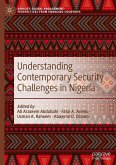Internal Security Management in Nigeria
Perspectives, Challenges and Lessons
Herausgegeben:Oshita, Oshita O.; Alumona, Ikenna Mike; Onuoha, Freedom Chukwudi
Internal Security Management in Nigeria
Perspectives, Challenges and Lessons
Herausgegeben:Oshita, Oshita O.; Alumona, Ikenna Mike; Onuoha, Freedom Chukwudi
- Gebundenes Buch
- Merkliste
- Auf die Merkliste
- Bewerten Bewerten
- Teilen
- Produkt teilen
- Produkterinnerung
- Produkterinnerung
This book explores the disturbing dimensions of the problem of insecurity in Nigeria, such as herdsmen violence, the Boko Haram insurgency, cybercrime, militancy in the Niger Delta, communal conflict and violence, as well as police corruption. It offers a comprehensive discussion of the theoretical foundations of internal security, the threats to internal security, the role of formal and informal agencies in internal security management and the challenges of internal security management.
Andere Kunden interessierten sich auch für
![Regulating the Peasantry: Regulating the Peasantry:]() Dan MouRegulating the Peasantry:77,99 €
Dan MouRegulating the Peasantry:77,99 €![Regulierung der Bauernschaft: Regulierung der Bauernschaft:]() Dan MouRegulierung der Bauernschaft:67,40 €
Dan MouRegulierung der Bauernschaft:67,40 €![Understanding Contemporary Security Challenges in Nigeria Understanding Contemporary Security Challenges in Nigeria]() Understanding Contemporary Security Challenges in Nigeria113,99 €
Understanding Contemporary Security Challenges in Nigeria113,99 €![Political Economy of Resource, Human Security and Environmental Conflicts in Africa Political Economy of Resource, Human Security and Environmental Conflicts in Africa]() Political Economy of Resource, Human Security and Environmental Conflicts in Africa105,99 €
Political Economy of Resource, Human Security and Environmental Conflicts in Africa105,99 €![The Future of the Gulf Region The Future of the Gulf Region]() Arno TauschThe Future of the Gulf Region113,99 €
Arno TauschThe Future of the Gulf Region113,99 €![Varying Dimensions of India's National Security Varying Dimensions of India's National Security]() Varying Dimensions of India's National Security97,99 €
Varying Dimensions of India's National Security97,99 €![Régulation de la paysannerie : Régulation de la paysannerie :]() Dan MouRégulation de la paysannerie :48,99 €
Dan MouRégulation de la paysannerie :48,99 €-
-
-
This book explores the disturbing dimensions of the problem of insecurity in Nigeria, such as herdsmen violence, the Boko Haram insurgency, cybercrime, militancy in the Niger Delta, communal conflict and violence, as well as police corruption. It offers a comprehensive discussion of the theoretical foundations of internal security, the threats to internal security, the role of formal and informal agencies in internal security management and the challenges of internal security management.
Produktdetails
- Produktdetails
- Verlag: Palgrave Macmillan / Springer Nature Singapore / Springer, Berlin
- Artikelnr. des Verlages: 978-981-13-8214-7
- 1st edition 2019
- Seitenzahl: 704
- Erscheinungstermin: 7. August 2019
- Englisch
- Abmessung: 216mm x 153mm x 42mm
- Gewicht: 1024g
- ISBN-13: 9789811382147
- ISBN-10: 981138214X
- Artikelnr.: 56158123
- Herstellerkennzeichnung Die Herstellerinformationen sind derzeit nicht verfügbar.
- Verlag: Palgrave Macmillan / Springer Nature Singapore / Springer, Berlin
- Artikelnr. des Verlages: 978-981-13-8214-7
- 1st edition 2019
- Seitenzahl: 704
- Erscheinungstermin: 7. August 2019
- Englisch
- Abmessung: 216mm x 153mm x 42mm
- Gewicht: 1024g
- ISBN-13: 9789811382147
- ISBN-10: 981138214X
- Artikelnr.: 56158123
- Herstellerkennzeichnung Die Herstellerinformationen sind derzeit nicht verfügbar.
Oshita Osang Oshita is a Professor of Peace and Development Studies and former Director General and Chief Executive Officer of the Institute for Peace and Conflict Resolution (IPCR), Ministry of Foreign Affairs, Abuja, Nigeria. Ikenna Mike Alumona is an Associate Professor of Political Science and Acting Head of Department at Chukwuemeka Odumegwu Ojukwu University, Igbariam, Anambra State, Nigeria. Freedom Chukwudi Onuoha is a Senior Lecturer at the Department of Political Science, University of Nigeria, Nsukka, and the Coordinator of the Security, Violence and Conflict (SVC) Research Group at the University.
Introduction: Understanding the Crisis of Internal Security Management in Nigeria.- Section One: Theoretical Perspectives.- Chapter 1 Theoretical issues in Internal Security Management in Nigeria: An Overview.- Chapter 2 The State and Internal Security Management in Nigeria: A Theoretical Perspective.- Chapter 3 A Historical Perspective of Nigeria's Internal Security since 1999.- Section Two: Threats to Internal Security in Nigeria.- Chapter 4 The Phenomenon of Boko Haram in Northern Nigeria.- Chapter 5 Herdsmen Violence in Nigeria.- Chapter 6 Re-examining Communal Conflicts in Central Nigeria: A Political Ecology Perspective.- Chapter 7 Youth Militancy in the Niger Delta Region.- Chapter 8 Unemployment, Migration and Cyber Criminality in Nigeria.- Chapter 9 The Challenges of Environmental Insecurity in Nigeria.- Chapter 10 Crimes and Internal Security in Nigeria.- Chapter 11 The Evolving Threat of Kidnapping for Ransom in Nigeria.- Chapter 12 The Emerging Culture of (Un)armed Violence by Legal/Illegal Revenue Collectors in Urban Cities in Nigeria: Evidence from Enugu State.- Chapter 13 Porous Borders and Human Trafficking in Nigeria.- Chapter 14 Arms Proliferation, Boko Haram Extremism and Insecurity in Nigeria.- Chapter 15 Police Corruption and Internal Security in Nigeria.- Chapter 16 Dimensions and Manifestations of Spiritual Threats and Insecurity in Contemporary Nigeria.- Section Three: Formal and Informal Agencies and the Management of Internal Security in Nigeria.- Chapter 17 The Nigerian Army and Internal Security Operations in the Fourth Republic.- Chapter 18 Military Joint Task Force and the Challenges of Internal Security Operations in Nigeria: The Plateau State Experience.- Chapter 19 The Nigerian Police and Internal Security Management in Nigeria.- Chapter 20 The Nigerian Security and Civil Defence Corps and Internal Security Management in Nigeria.- Chapter 21 The Nigerian Immigration Service and Internal Security Management in Nigeria.- Chapter 22 Nigerian Prisons Service and Internal Security Management in Nigeria.- Chapter 23 Non-State Actors and Internal Security Management in Nigeria: The Case of Private Security Companies.- Chapter 24 Non State Actors and Internal Security Management in Nigeria: The Case of Vigilante Groups.- Section Four: Challenges of Internal Security Management in Nigeria.- Chapter 25 The Nigerian Project and the Quest for Sustainable National Security.- Chapter 26 The Political Economy of Security Votes and internal security management in Nigeria.- Chapter 27 Nigeria's Changing Security Matrix and Management of Insecurity.- Chapter 28 Security Funding, Accountability and Internal Security Management in Nigeria.- Chapter 29 Social (in)security and Internal Security Management in Nigeria.- Chapter 30 Gender and Nigeria's Internal Security Management.- Chapter 31 Youth and Nigeria's Internal Security Management.- Chapter 32 The African - European Union Partnership on Peace and Security and Internal Security Management in Nigeria.- Chapter 33 Internal Security Threats and Economic Prosperity in Nigeria: Implications and Policy Options.- Chapter 34 The Political Economy of Security Votes and internal security management.- Chapter 35 Conclusion: Rethinking Nigeria's Internal Security Architecture.
Introduction: Understanding the Crisis of Internal Security Management in Nigeria.- Section One: Theoretical Perspectives.- Chapter 1 Theoretical issues in Internal Security Management in Nigeria: An Overview.- Chapter 2 The State and Internal Security Management in Nigeria: A Theoretical Perspective.- Chapter 3 A Historical Perspective of Nigeria's Internal Security since 1999.- Section Two: Threats to Internal Security in Nigeria.- Chapter 4 The Phenomenon of Boko Haram in Northern Nigeria.- Chapter 5 Herdsmen Violence in Nigeria.- Chapter 6 Re-examining Communal Conflicts in Central Nigeria: A Political Ecology Perspective.- Chapter 7 Youth Militancy in the Niger Delta Region.- Chapter 8 Unemployment, Migration and Cyber Criminality in Nigeria.- Chapter 9 The Challenges of Environmental Insecurity in Nigeria.- Chapter 10 Crimes and Internal Security in Nigeria.- Chapter 11 The Evolving Threat of Kidnapping for Ransom in Nigeria.- Chapter 12 The Emerging Culture of (Un)armed Violence by Legal/Illegal Revenue Collectors in Urban Cities in Nigeria: Evidence from Enugu State.- Chapter 13 Porous Borders and Human Trafficking in Nigeria.- Chapter 14 Arms Proliferation, Boko Haram Extremism and Insecurity in Nigeria.- Chapter 15 Police Corruption and Internal Security in Nigeria.- Chapter 16 Dimensions and Manifestations of Spiritual Threats and Insecurity in Contemporary Nigeria.- Section Three: Formal and Informal Agencies and the Management of Internal Security in Nigeria.- Chapter 17 The Nigerian Army and Internal Security Operations in the Fourth Republic.- Chapter 18 Military Joint Task Force and the Challenges of Internal Security Operations in Nigeria: The Plateau State Experience.- Chapter 19 The Nigerian Police and Internal Security Management in Nigeria.- Chapter 20 The Nigerian Security and Civil Defence Corps and Internal Security Management in Nigeria.- Chapter 21 The Nigerian Immigration Service and Internal Security Management in Nigeria.- Chapter 22 Nigerian Prisons Service and Internal Security Management in Nigeria.- Chapter 23 Non-State Actors and Internal Security Management in Nigeria: The Case of Private Security Companies.- Chapter 24 Non State Actors and Internal Security Management in Nigeria: The Case of Vigilante Groups.- Section Four: Challenges of Internal Security Management in Nigeria.- Chapter 25 The Nigerian Project and the Quest for Sustainable National Security.- Chapter 26 The Political Economy of Security Votes and internal security management in Nigeria.- Chapter 27 Nigeria's Changing Security Matrix and Management of Insecurity.- Chapter 28 Security Funding, Accountability and Internal Security Management in Nigeria.- Chapter 29 Social (in)security and Internal Security Management in Nigeria.- Chapter 30 Gender and Nigeria's Internal Security Management.- Chapter 31 Youth and Nigeria's Internal Security Management.- Chapter 32 The African - European Union Partnership on Peace and Security and Internal Security Management in Nigeria.- Chapter 33 Internal Security Threats and Economic Prosperity in Nigeria: Implications and Policy Options.- Chapter 34 The Political Economy of Security Votes and internal security management.- Chapter 35 Conclusion: Rethinking Nigeria's Internal Security Architecture.








